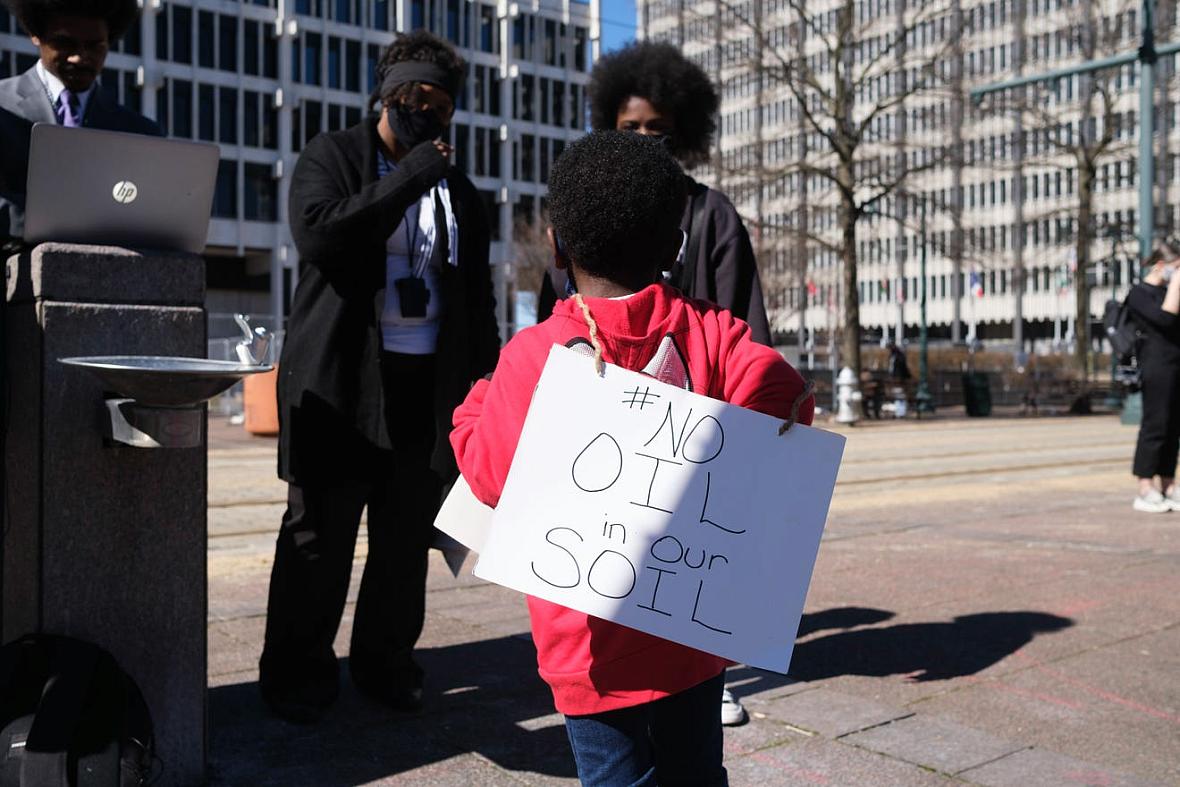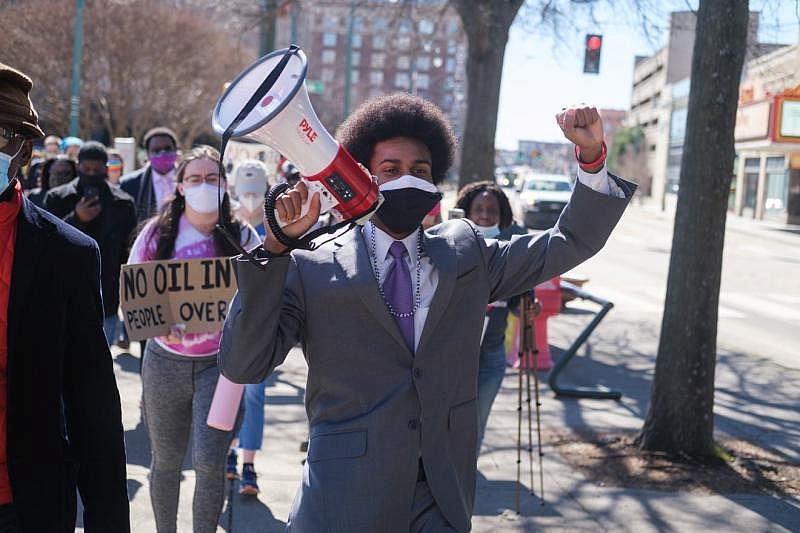Near Byhalia pipeline planned connection point, Valero leaked 800 gallons of crude oil in 2020
This story is part of a larger project led by Sarah Macaraeg, a 2019 Data Fellow who is investigating the disproportionate number of asthma diagnoses and severe symptoms among Memphis children.
Other stories include:
5 things to know: How polluted streams interact with the Memphis Sand aquifer
Byhalia pipeline: Toxic refinery pollution, monitoring blind spot in southwest Memphis
Toxic air. Insufficient monitors. Why Memphis families fighting Byhalia pipeline have had enough
More than 100,000 people in Shelby County are facing a pandemic without health insurance
To halt 'fast-track' Byhalia pipeline permit, Memphis groups file lawsuit in federal court

A young boy wears a sign outside of City Hall, protesting the construction of the Byhalia Connection Pipeline, Tuesday, Feb 23, 2021, in Memphis, Tenn. Brandon Dahlberg / For CommercialAppeal.com
Brandon Dahlberg/ For CommerciallAppeal.com
An 800-gallon leak of crude oil and 10-pound release of benzene, a chemical compound the World Health Organization classifies as carcinogenic, occurred in January 2020 near the planned destination of the Byhalia pipeline, National Response Center and Pipeline and Hazardous Safety Administration records show.
The Byhalia pipeline project of Valero Energy Corp. and Plains All American Pipeline faces mounting resistance from south and southwest Memphis residents impacted by the planned 45-mile project, running beneath the ground from the Valero refinery in South Memphis to a site on Wingo Road, just south of the state border in Marshall County, Mississippi.
Co-founded by residents, the grassroots group Memphis Community Against the Pipeline is demanding local, state and federal officials protect their health from pipeline-related hazards — and that of the city's drinking water supply.
"We declare the people in southwest Memphis' air and water does matter just as much as the people down here Downtown," Keshaun Pearson, of Memphis Community Against the Pipeline, said at a rally Feb. 22.
Records from the 19-barrel release at Valero's Marshall County storage site in 2020 show an automated monitoring system did not detect the leak, attributed to corrosion in carbon steel facility piping installed in 1984. Federal regulations define one barrel of oil as equivalent to 42 gallons.
The spill was contained on Valero's site and the oil was recovered, the company reported, citing nearly $950,000 spent on its emergency response and repairs — and just over $1,000 on environmental remediation.
The commissioning of the Dakota Access Pipeline's route through western Tennessee in 2017 involved two leaks, Pipeline and Hazardous Materials Safety Administration records also show.
One occurred in neighboring Fayette County, where the Memphis drinking water supply is recharged by rainfall.
On its site, the Byhalia Connection pledges to protect the environment and "safety during all stages". Public relations consultant Deidre Malone referred a request for comment to a Plains All American spokesperson who said the company is committed to "designing, constructing, operating and maintaining our assets in a safe, reliable and responsible manner," using technology and "collective learnings from past projects".
The company paid a $60 million settlement in March 2020 related to its 2,934-barrel spill of crude oil on the California coast in 2015. Since the beginning of that year, Plains All American has filed over 120 incident reports around the country, Pipeline and Hazardous Material Safety Administration data show. A related corporate entity, Plains Marketing, L.P. filed an additional 18.
Inquiries to Valero's Memphis public affairs manager and corporate headquarters did not receive a response Tuesday. The company's January 2020 crude oil release near Memphis is one of 11 cumulative incidents since 2015 reported by two Valero corporate entities involved in petroleum processing, the federal regulatory agency data show.
The companies currently partner on the 440-mile Diamond Pipeline, which pumps crude oil from Cushing, Oklahoma to the Valero refinery in Memphis, traversing the Mississippi River.
Advocates urge protection of Memphis drinking water supply
Around 800 feet beneath the Mississippi River, the Memphis Sand aquifer suppliesaround 180 million gallons of water in Shelby County daily, including drinking water that's purified to a degree geologists consider extraordinary — a result of the water's filtration through sand as it seeped west to the Mississippi River.
A layer of clay protects the aquifer, but not fully. Breaches in the clay discovered by scientists and related water tests raised concerns of the aquifer's susceptibility to contamination, before Byhalia entered the picture.
Memphis City council member Dr. Jeff Warren, cosponsor of a resolution to oppose the pipeline spoke about the risk to the city's drinking water supply in a recent virtual Town Hall.
"It's going very close over the aquifer, near a lot of clay layers that are fragile and broken and easily a problem," he said of the Byhalia pipeline's route. "This is just a dumb thing to do, in an earthquake-prone area."
The Tennessee Department of Environment and Conservation cited the pipeline's shallow depth in granting the project, which crosses six streams, an Aquatic Resource and Alteration Permit.
Pressed by advocates to address the relationship between possible surface water contamination and breaches in the aquifer's protective layer, TDEC Director of External Affairs Ronnie Adkins recognized the limits of the agency's regulatory power. "There are shortfalls to permits, some things we don't consider, unfortunately," he said.
Tennessee State Sen. Raumesh Akbari has since introduced legislation that would "empower local leaders to conserve the underground water supply by requiring more comprehensive environmental studies prior to approving large utility projects" and enhance monitoring, Tennessee Senate Democrats announced Friday.
Two DAPL spills in Tennessee
Pipeline and Hazardous Materials Administration data also shows two spills the operators of the Dakota Access Pipeline reported while commissioning its route through western Tennessee in 2017.
The $3.8 billion pipeline runs from North Dakota to a terminal in Patoka, Illinois, and then passes through neighboring Fayette County on its route to the Gulf Coast. The Standing Rock Sioux Tribe led months of protests against the 1,700-mile construction, which passes beneath the Missouri River near the tribe's drinking water supply.
In June 2017, DAPL operators reported around 119 barrels of crude, or nearly 5,000 gallons, spilled at a pump station in Dyersburg, Tennessee, 75 miles northeast of Memphis. The federal regulatory records show a piece of stainless steel that threads pipes together, installed in 2016, broke.
DAPL reported a $15,000 emergency response on an incident report that shows no environmental remediation expense.
The prior month, another incident report filed with the Pipeline and Hazardous Materials Safety Administration shows around 20 gallons of oil, a half-barrel, spilled in Fayette County near a Mason, Tennessee milepost after a 2016 valve failed. DAPL operators reported the recovery of the half-barrel and an $8,000 environmental remediation expense.
Justin Pearson leads chants during a march against the construction of the Byhalia Connection Pipeline, Tuesday, Feb. 23, 2021, in Memphis, TN. Brandon Dahlberg/For CommercialAppeal.com
Shelby County Mayor Lee Harris cited the thousands of significant pipeline incidents reported in the last 20 years while joining elected officials who've voiced opposition to the pipeline's impact on Black communities in Memphis and the risks posed to the city's drinking water supply.
"Amid a recent water crisis, it's even more clear that we have to do everything we can to protect our water supply," Harris said in a statement. "The pipeline would run through predominantly African American neighborhoods and potentially endanger communities that have historically borne the brunt of environmental degradation."
Ahead of Memphis City Council and Shelby County Commission votes on the pipeline, Justin Pearson, co-founder of Memphis Community Against the Pipeline, said the residents' fight will continue to grow.
"Every place where there are people, matter. And land is as sacred as anything else that we have," he said. "The water that we drink we'll defend 'til the end."
Sarah Macaraeg is an award-winning journalist who writes on accountability, solutions and diverse communities for The Commercial Appeal. She can be reached at sarah.macaraeg@commercialappeal.com or on Twitter @seramak.
[This story was originally published by Commercial Appeal.]

